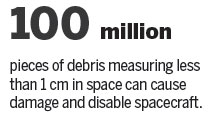China established a specialized agency on Monday to track and deal with space debris in response to the increasing threat posed to the nation's space assets by orbiting junk.
The Space Debris Monitoring and Application Center, part of the China National Space Administration, is responsible for tracking waste, analyzing hazards, developing prevention and disposal plans, setting up a database and communicating with other nations and international organizations.
It will be managed by the Chinese Academy of Sciences' National Astronomical Observatories.
"The situation is serious as humankind's space activities are rapidly adding new orbiting debris, posing a severe threat to spacecraft," Tian Yulong, the administration's secretary-general, said on Monday. "Monitoring and neutralizing it has become a pressing task."
Space debris includes everything from spent rocket stages and old satellites to fragments arising from disintegration, erosion and collisions. Some debris may strike operational spacecraft.
"There are more than 100 million pieces of debris measuring less than 1 cm in space that together weigh thousands of metric tons," Tian added. "Impacts by these particles can cause damage and disable spacecraft."
China has about 130 spacecraft, mostly satellites, in orbit, and there were more than 30 close encounters involving space debris last year, he said.
As of September 2013, more than 500,000 pieces of debris were being tracked as they orbited the Earth. They traveled at speeds of up to 28,000 kph, fast enough for a relatively small piece of debris to damage a satellite or a spacecraft, according to the United States' NASA.

All pieces of debris larger than 10 cm are tracked by NASA using radar and telescopes. Many millions of pieces of debris are so small that they cannot be tracked, the agency added.
A 1 cm object moving at 17,000 kph would deliver as much energy as a hand grenade and could destroy a spacecraft, according to experts.
China started a space debris action plan in 2000 and has allocated a considerable amount of resources to research the detection, prevention and mitigation of space debris, Tian said.
He disclosed that the country has installed systems on its Long March rockets that prevent unused fuel from exploding and creating new debris.
"However, developing ways to capture or remove orbital junk remains a tough challenge for scientists around the world and requires close cooperation among space authorities," Tian said.
Yin Hejun, vice-president of the Chinese Academy of Sciences, said his organization releases early warnings about pieces of space debris to the controllers of China's satellites on a daily basis.
zhaolei@chinadaily.com.cn
